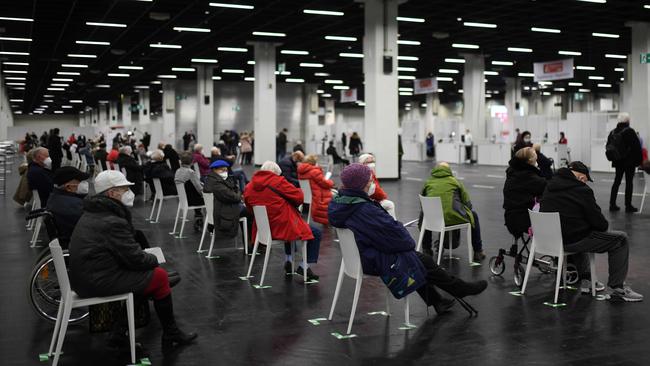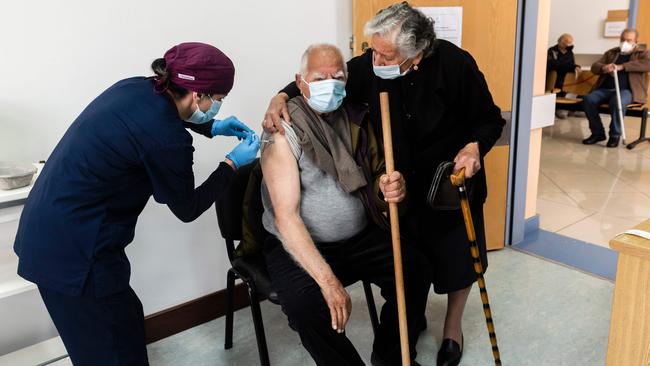COVID-19 variants outpace Europe’s slow vaccine rollout
A vaccine shortage means Europe hasn’t even started the race against coronavirus mutations that will define health policy in coming years.

The spread of highly contagious coronavirus variants is accelerating in Europe, outpacing an already-slow vaccine rollout and forcing governments to extend and possibly tighten restrictions on civil society and businesses to prevent a new surge in infections before the end of the region’s winter.
A shortage of vaccines in the EU — only 4.8 per cent of Europeans have been vaccinated since late December — means the continent hasn’t even started the race against virus mutations that many experts say will define health policy in coming months and years.
Most European countries are experiencing a steady decline in infections following months of lockdowns, yet the spread of the new variants first identified in the UK, South Africa and Brazil — known as B.1.1.7, B.1.351, and P.1 respectively — is accelerating, meaning these viruses are rapidly gaining ground under cover from the overall declining numbers.

The three variants now circulating in Europe are believed to be more easily transmitted, and potentially more dangerous, than the original pathogen that still makes up the majority of cases in Europe. There is also mounting evidence that some strains might be less susceptible to the vaccines currently authorised in the region, according to the European Centre for Disease Prevention and Control.
The variant first identified in Britain accounted for 96 per cent of viral samples examined at three major laboratories in England by early this month, compared with just over a third at the beginning of December, according to the UK government.
In Denmark, the British variant accounts for 27 per cent of viral samples, in France more than 13 per cent, while in Portugal it is 45 per cent, the ECDC said. In Italy, the variant currently represents around 18 per cent of new infections, according to a survey carried out by Italy’s National Health Institute, which estimates that the British strain will become dominant within months. Dutch authorities have predicted that it will account for almost all new cases by the middle of next month.

The South African and Brazilian variants accounted for between 4 per cent and 5 per cent of cases in France, according to a recent study. In Germany, where labs aren’t testing extensively for the presence of new variants, authorities estimated these made up around 6 per cent of all infections two weeks ago. The result of a new study to be released this week is expected to show a sharp rise. Authorities in Berlin said this week that the British variant would become dominant in the city by April at the latest.
The spread of highly infectious coronavirus variants have become the main factor holding back the lifting of confinement restrictions in Europe, as nations seek to prevent a new surge in infection amid a dire shortage of vaccines.

The reluctance to ease increasingly unpopular and economically devastating lockdowns comes despite weeks of stable or falling COVID-19 case numbers in most European countries.
All three vaccines currently used in Europe have been found in studies to have a diminished efficacy against the new variants. South Africa even suspended vaccinations with the AstraZeneca shot amid concerns it wouldn’t be effective against the local variant. The UK government, however, said it was confident that the British COVID-19 variant would be neutralised by existing vaccines.
Viruses mutate randomly all the time. Yet in environments where populations develop immunity either after becoming sick or getting infected, some mutations that make the virus more infectious or allow it to evade immunity can quickly become highly prevalent.
The ability of medical authorities to estimate the prevalence of new mutations varies across Europe, and different countries use different methods to assess transmission rates. Yet there is little doubt these new forms are spreading fast everywhere.

Delayed vaccine orders and approval by the EU, coupled with manufacturing hiccups, mean European nations have been unrolling their vaccination campaigns at a glacial pace.
But even nations that have been able to vaccinate comparatively large numbers of people are concerned.
The UK has vaccinated more than a quarter of its population and in England, the pace of the spread of the B.1.1.7 variant has almost halved due to the lockdown put in place since the start of January.
In the week ending February 6, 0.8 per cent of the English population tested positive for the UK variant, down from nearly 1.5 per cent at the end of last year, according to a survey by the UK Office for National Statistics. Government officials expect the UK variant to remain dominant because it is more transmissible than other imported variants, including one from South Africa.

But authorities must remain cautious because the more people get infected, the higher the likelihood is that new variants can emerge that could put even people who have been vaccinated at risk, Prime Minister Boris Johnson said this week.
“No vaccination program is 100 per cent effective,” he said.
In Germany, where labs aren’t testing extensively for the presence of new variants, authorities estimated these made up around 6 per cent of all infections two weeks ago. The result of a new study to be released this week is expected to show a sharp rise. Authorities in Berlin said on Monday that the British variant would become dominant in the city by April at the latest.
The presence of new variants meant that the coming weeks would probably be the most difficult phase of the pandemic, Chancellor Angela Merkel said last week.

A spokesman for Ms Merkel said this week that the government was working on a three-stage reopening plan, with 14-day buffers between each stage to monitor the epidemiological situation before lifting a new set of restrictions. The gradual approach was designed to avoid a quick resurgence of infections after the reopening, the spokesman said.
Anxiety about the new variants has led the German government to close sections of its borders, triggering a diplomatic row as more than 5000 people who were turned back to Austria and the Czech Republic. In response, the government in Vienna summoned the German ambassador to complain, while the French government sought assurances from German authorities that similar restrictions wouldn’t be put in place along their mutual border.
One French region on Germany’s border has registered more than 300 cases of the South African and Brazilian variants in recent days, French Health Minister Olivier Véran said last week.

Some countries are also considering tighter confinement measures. Italy’s government is discussing fresh restrictions to prevent a surge in new cases caused by the more contagious UK strain. Over the weekend it abruptly halted plans to reopen ski resorts, asked travellers from Austria to self-isolate, and reintroduced a ban on travellers from Brazil.
Walter Ricciardi, a scientific adviser to the Italian government, is pushing for a strict lockdown to quash the circulation of the virus and resume an effective testing and tracing system while the vaccine rollout continues.
“We need to change our course of action and pursue a strategy that doesn’t involve coexisting with the virus,” Mr. Ricciardi said. “We need a no-Covid strategy.”
Additional reporting: Margherita Stancati
The Wall Street Journal
More Coverage







